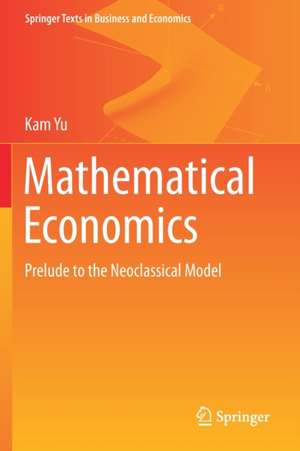Mathematical Economics: Prelude to the Neoclassical Model: Springer Texts in Business and Economics
Autor Kam Yuen Limba Engleză Paperback – 15 noi 2020
| Toate formatele și edițiile | Preț | Express |
|---|---|---|
| Paperback (1) | 483.92 lei 6-8 săpt. | |
| Springer International Publishing – 15 noi 2020 | 483.92 lei 6-8 săpt. | |
| Hardback (1) | 643.34 lei 6-8 săpt. | |
| Springer International Publishing – 15 noi 2019 | 643.34 lei 6-8 săpt. |
Din seria Springer Texts in Business and Economics
-
 Preț: 360.01 lei
Preț: 360.01 lei -
 Preț: 548.24 lei
Preț: 548.24 lei - 17%
 Preț: 490.70 lei
Preț: 490.70 lei - 15%
 Preț: 642.51 lei
Preț: 642.51 lei - 19%
 Preț: 509.83 lei
Preț: 509.83 lei -
 Preț: 367.40 lei
Preț: 367.40 lei - 15%
 Preț: 562.31 lei
Preț: 562.31 lei -
 Preț: 338.80 lei
Preț: 338.80 lei -
 Preț: 374.14 lei
Preț: 374.14 lei -
 Preț: 185.09 lei
Preț: 185.09 lei -
 Preț: 382.19 lei
Preț: 382.19 lei - 19%
 Preț: 465.60 lei
Preț: 465.60 lei - 13%
 Preț: 490.92 lei
Preț: 490.92 lei -
 Preț: 435.38 lei
Preț: 435.38 lei - 15%
 Preț: 562.12 lei
Preț: 562.12 lei - 19%
 Preț: 534.43 lei
Preț: 534.43 lei -
 Preț: 359.92 lei
Preț: 359.92 lei -
 Preț: 361.88 lei
Preț: 361.88 lei - 17%
 Preț: 363.97 lei
Preț: 363.97 lei -
 Preț: 473.41 lei
Preț: 473.41 lei -
 Preț: 361.11 lei
Preț: 361.11 lei - 23%
 Preț: 730.81 lei
Preț: 730.81 lei - 15%
 Preț: 479.55 lei
Preț: 479.55 lei -
 Preț: 555.90 lei
Preț: 555.90 lei - 17%
 Preț: 522.64 lei
Preț: 522.64 lei - 20%
 Preț: 694.02 lei
Preț: 694.02 lei - 13%
 Preț: 447.86 lei
Preț: 447.86 lei - 18%
 Preț: 754.79 lei
Preț: 754.79 lei - 17%
 Preț: 363.29 lei
Preț: 363.29 lei - 17%
 Preț: 491.51 lei
Preț: 491.51 lei -
 Preț: 360.45 lei
Preț: 360.45 lei - 17%
 Preț: 395.83 lei
Preț: 395.83 lei - 15%
 Preț: 597.20 lei
Preț: 597.20 lei - 17%
 Preț: 523.85 lei
Preț: 523.85 lei -
 Preț: 320.05 lei
Preț: 320.05 lei - 17%
 Preț: 459.66 lei
Preț: 459.66 lei - 20%
 Preț: 693.45 lei
Preț: 693.45 lei -
 Preț: 548.52 lei
Preț: 548.52 lei - 20%
 Preț: 571.11 lei
Preț: 571.11 lei - 17%
 Preț: 431.53 lei
Preț: 431.53 lei - 17%
 Preț: 366.15 lei
Preț: 366.15 lei - 20%
 Preț: 693.81 lei
Preț: 693.81 lei - 8%
 Preț: 428.31 lei
Preț: 428.31 lei - 15%
 Preț: 650.55 lei
Preț: 650.55 lei
Preț: 483.92 lei
Nou
Puncte Express: 726
Preț estimativ în valută:
92.61€ • 95.67$ • 77.07£
92.61€ • 95.67$ • 77.07£
Carte tipărită la comandă
Livrare economică 26 martie-09 aprilie
Preluare comenzi: 021 569.72.76
Specificații
ISBN-13: 9783030272913
ISBN-10: 3030272915
Pagini: 214
Ilustrații: XIII, 214 p. 26 illus., 18 illus. in color.
Dimensiuni: 155 x 235 mm
Greutate: 0.33 kg
Ediția:1st ed. 2019
Editura: Springer International Publishing
Colecția Springer
Seria Springer Texts in Business and Economics
Locul publicării:Cham, Switzerland
ISBN-10: 3030272915
Pagini: 214
Ilustrații: XIII, 214 p. 26 illus., 18 illus. in color.
Dimensiuni: 155 x 235 mm
Greutate: 0.33 kg
Ediția:1st ed. 2019
Editura: Springer International Publishing
Colecția Springer
Seria Springer Texts in Business and Economics
Locul publicării:Cham, Switzerland
Cuprins
Chapter 1. Logic and Proof.- Chapter 2. Sets and Relations.- Chapter 3. Basic Topology.- Chapter 4. Linear Algebra.- Chapter 5. Vector Calculus.- Chapter 6. Convex Analysis.- Chapter 7. Optimization.- Chapter 8. Probability.- Chapter 9. Dynamic Modeling.
Recenzii
“Even though the book is aimed at serving as a single semester course, it is sufficiently rich in its contents. This makes it stand out from other similar titles. … Sufficient references have been included for those desirous of delving deeper into the mathematical fundamentals of economics. The book has been written with a lot of caution, brevity and wisdom; and is worth every penny spent on it.” (Firdous Ahmad Mala, Journal of Economics, Vol. 136, 2022)
“This book by Prof. Kam Yu is an interesting addition to the literature on the basic mathematical tools for economic analysis (more specifically, for neoclassical economics). It covers a wide range of topics, ranging from topology to probability theory, going through linear algebra, optimization theory and dynamic programming. Its strength lies in a large number of examples and exercises. In that sense, it is useful for junior andsenior college students.” (Fernando Tohmé, zbMATH 1471.91005, 2021)
Notă biografică
Kam Yu studied engineering, mathematics, and economics in Hong Kong, the UK, and Canada. He teaches economics at Lakehead University, where he received a teaching award in 2016. His primary research interest is in the area of social and economic measurement.
Textul de pe ultima copertă
This textbook provides a one-semester introduction to mathematical economics for first year graduate and senior undergraduate students. Intended to fill the gap between typical liberal arts curriculum and the rigorous mathematical modeling of graduate study in economics, this text provides a concise introduction to the mathematics needed for core microeconomics, macroeconomics, and econometrics courses. Chapters 1 through 5 builds students’ skills in formal proof, axiomatic treatment of linear algebra, and elementary vector differentiation. Chapters 6 and 7 present the basic tools needed for microeconomic analysis. Chapter 8 provides a quick introduction to (or review of) probability theory. Chapter 9 introduces dynamic modeling, applicable in advanced macroeconomics courses. The materials assume prerequisites in undergraduate calculus and linear algebra. Each chapter includes in-text exercises and a solutions manual, making this text ideal for self-study.
Caracteristici
Provides a one-semester introduction to mathematical economics for first year graduate and senior undergraduate students Geared towards helping students develop mathematical maturity in a short period of time Covers expanded topics such as logic and proof, probability theory, and dynamic modeling Includes end-of-chapter questions with solutions Request lecturer material: sn.pub/lecturer-material
